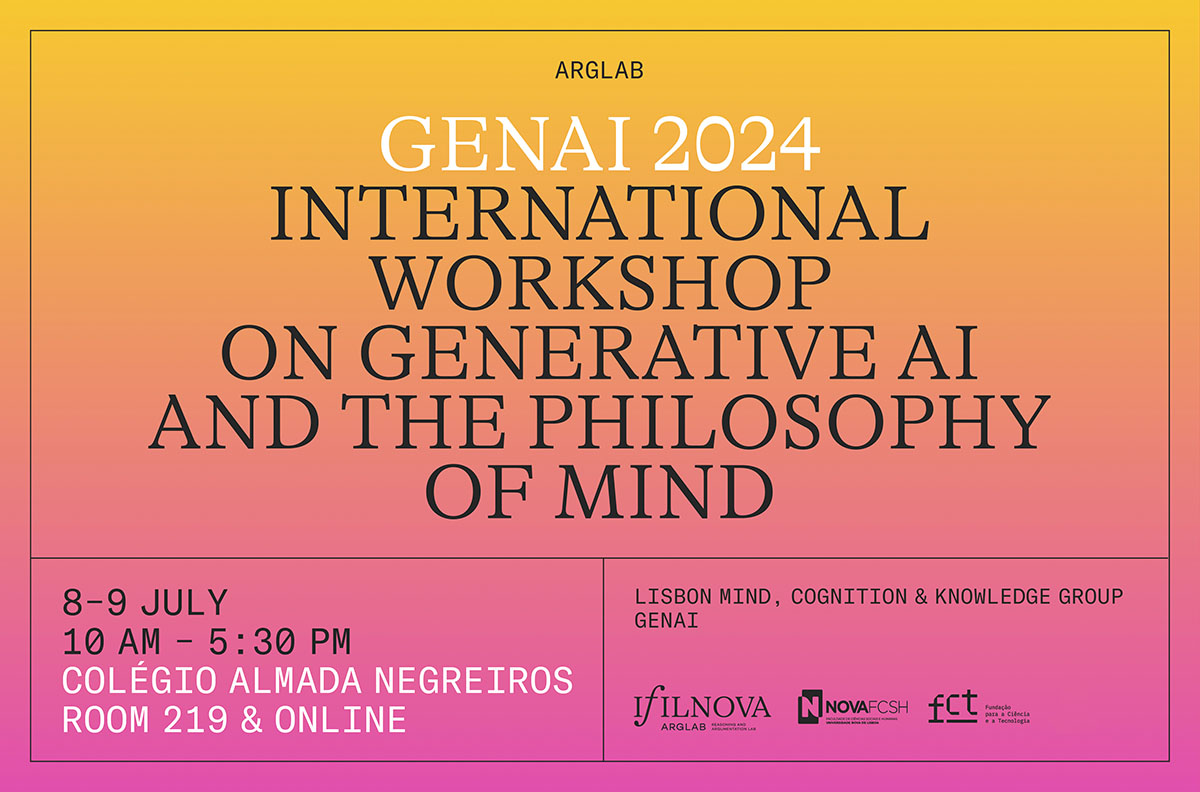GENAI 2024: International Workshop on Generative AI and the Philosophy of Mind

The International Workshop on Generative AI (GENAI) and the Philosophy of Mind, to be held in Lisbon, Portugal on July 8 and 9, 2024, aims to explore the intersection of generative artificial intelligence (AI) and the philosophy of mind, fostering interdisciplinary discussions and collaborations between researchers in AI, philosophy, cognitive science, and related fields.
Generative AI, particularly deep learning models such as generative adversarial networks (GANs), variational autoencoders (VAEs), and large language models (LLMs), has made significant strides in recent years, enabling machines to generate content that mimics human-like creativity, imagination, and understanding. These advancements raise profound questions on the nature of consciousness, creativity, personal identity, self and how cognition is organized. They invite philosophical inquiry into the implications of generative AI for our understanding of the mind, cognition and our affective lives.
The meeting takes place in the scope of the GENAI project, which investigates human cognitive flourishing against the backdrop of generative AI systems. The workshop is also organized in the context of the new “Digital Andy” System produced by the University of Southampton and NOVA University Lisbon. Digital Andy is a proof of concept augmented LLM based on the written works of the philosopher Andy Clark. Several talks will feature findings stemming from the use of this model.
The workshop will feature talks by the following leading experts in AI, philosophy, and cognitive science: Keith Frankish, Ron Chrisley, Andy Clark, Eric Schwitzgebel, Gloria Andrada, Jeremy Pober, Kesavan Thanagopal, Laura Gorrieri, Paul Smart, Pietro Chiericoni, Rita Lobo, Robert W. Clowes.
Org. Paul Smart, Robert Clowes & Nuno Venturinha
To register in person or online please contact Robert Clowes at robertclowes@fcsh.unl.pt.
Programme
8 July
10:00–10:15 Workshop Introduction by Robert W. Clowes (NOVA University Lisbon)
10:15–11:00 Paul Smart (University of Southampton) & Robert W. Clowes (NOVA University Lisbon), Digital Andy: A Novel Retrieval-Augmented Generation LLM for Philosophical Research
11:00–11:20 Robert W. Clowes (NOVA University Lisbon) & Digital Andy (in the cloud), Generative Hermeneutics with Digital Andy
11:20–11:50 Coffee Break
11:50–12:30 Pietro Chiericoni (Università della Svizzera italiana), AI, Creativity, and the Limits of Experience
12:30–14:00 Lunch
14:00–14:40 Rita Lobo (NOVA University Lisbon), The Virtual Therapist and LLMs
14:40–15:20 Robert W. Clowes (NOVA University Lisbon), Enhanced Confabulation, Ersatz Others and Being Someone
15:20–15:50 Coffee
15:50–17:00 Keynote Speaker | Ron Chrisley (University of Sussex), Transformers and Mental Imagery
9 July
10:00–11:10: Keynote Speaker | Keith Frankish (University of Crete / University of Sheffield), LLMs Are Just Playing Games With Us
11:10–11:40 Coffee
11:40–12:20 Gloria Andrada (NOVA University Lisbon), Generative AI and Perceptual Filters
12:20–13:00 Paul Smart (University of Southampton), Robert W. Clowes (NOVA University Lisbon) & Andy Clark (University of Sussex), ChatGPT, Extended: Large Language Models and the Extended Mind
13:00–14:30 Lunch
14:30–15:10 Laura Gorrieri (Università di Torino), Is ChatGPT Full of Bullshit?
15:10–15:50 Kesavan Thanagopal (University of Notre Dame), To Trust or Not to Trust: Outlining an Account of Trust Without Agency
15:50–16:20 Coffee
16:20–17:30 Jeremy Pober (Universidade de Lisboa) & Eric Schwitzgebel (U. C. Berkeley), The Copernican Argument for Alien Consciousness: The Mimicry Argument Against Robot Consciousness
17:30 END OF DAY 2: WORKSHOP CLOSE
Event supported by the Foundation for Science and Technology (Fundação para a Ciência e para a Tecnologia) of the Portuguese Ministry of Education and Science within the scope of the research projects UIDB/00183/2020 and “GENAI — Exploring Human Cognitive Flourishing against the background of GENerative AI: Sustaining Deep Minds in Our New Cognitive Ecology”.

